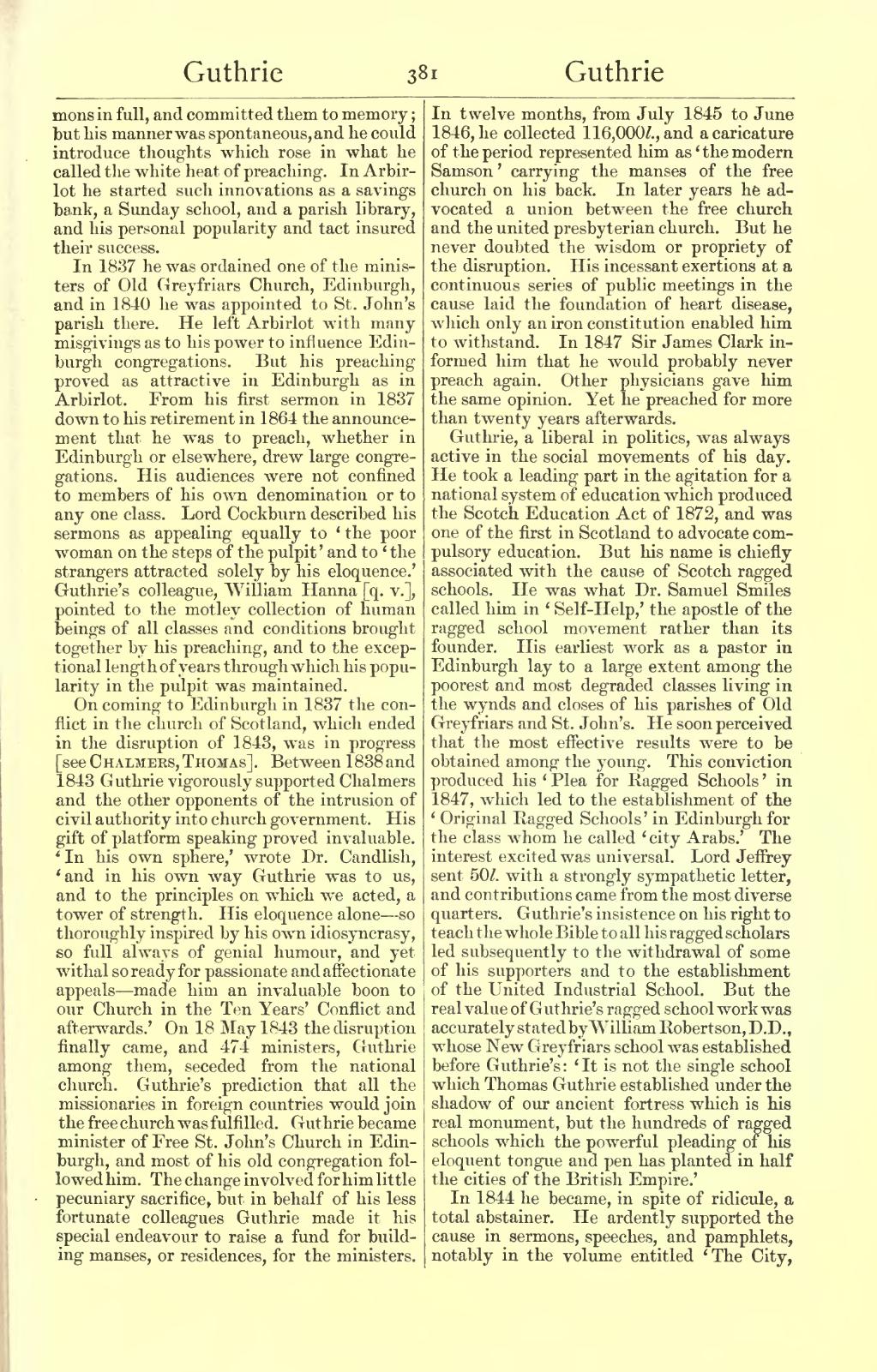mons in full, and committed them to memory; but his manner was spontaneous, and he could introduce thoughts which rose in what he called the white heat of preaching. In Arbirlot he started such innovations as a savings bank, a Sunday school, and a parish library, and his personal popularity and tact insured their success.
In 1837 he was ordained one of the ministers of Old Greyfriars Church, Edinburgh, and in 1840 he was appointed to St. John's parish there. He left Arbirlot with many misgivings as to his power to influence Edinburgh congregations. But his preaching proved as attractive in Edinburgh as in Arbirlot. From his first sermon in 1837 down to his retirement in 1864 the announcement that he was to preach, whether in Edinburgh or elsewhere, drew large congregations. His audiences were not confined to members of his own denomination or to any one class. Lord Cockburn described his sermons as appealing equally to 'the poor woman on the steps of the pulpit' and to 'the strangers attracted solely by his eloquence.' Guthrie's colleague, William Hanna [q. v.], pointed to the motley collection of human beings of all classes and conditions brought together by his preaching, and to the exceptional length of years through which his popularity in the pulpit was maintained.
On coming to Edinburgh in 1837 the conflict in the church of Scotland, which ended in the disruption of 1843, was in progress [see Chalmers, Thomas]. Between 1838 and 1843 Guthrie vigorously supported Chalmers and the other opponents of the intrusion of civil authority into church government. His gift of platform speaking proved invaluable. 'In his own sphere,' wrote Dr. Candlish, 'and in his own way Guthrie was to us, and to the principles on which we acted, a tower of strength. His eloquence alone—so thoroughly inspired by his own idiosyncrasy, so full always of genial humour, and yet withal so ready for passionate and affectionate appeals—made him an invaluable boon to our Church in the Ten Years' Conflict and afterwards.' On 18 May 1843 the disruption finally came, and 474 ministers, Guthrie among them, seceded from the national church. Guthrie's prediction that all the missionaries in foreign countries would join the free church was fulfilled. Guthrie became minister of Free St. John's Church in Edinburgh, and most of his old congregation followed him. The change involved for him little pecuniary sacrifice, but in behalf of his less fortunate colleagues Guthrie made it his special endeavour to raise a fund for building manses, or residences, for the ministers. In twelve months, from July 1845 to June 1846, he collected 116,000l., and a caricature of the period represented him as 'the modern Samson' carrying the manses of the free church on his back. In later years he advocated a union between the free church and the united presbyterian church. But he never doubted the wisdom or propriety of the disruption. His incessant exertions at a continuous series of public meetings in the cause laid the foundation of heart disease, which only an iron constitution enabled him to withstand. In 1847 Sir James Clark informed him that he would probably never preach again. Other physicians gave him the same opinion. Yet he preached for more than twenty years afterwards.
Guthrie, a liberal in politics, was always active in the social movements of his day. He took a leading part in the agitation for a national system of education which produced the Scotch Education Act of 1872, and was one of the first in Scotland to advocate compulsory education. But his name is chiefly associated with the cause of Scotch ragged schools. He was what Dr. Samuel Smiles called him in 'Self-Help,' the apostle of the ragged school movement rather than its founder. His earliest work as a pastor in Edinburgh lay to a large extent among the poorest and most degraded classes living in the wynds and closes of his parishes of Old Greyfriars and St. John's. He soon perceived that the most effective results were to be obtained among the young. This conviction produced his 'Plea for Ragged Schools' in 1847, which led to the establishment of the 'Original Ragged Schools' in Edinburgh for the class whom he called 'city Arabs.' The interest excited was universal. Lord Jeffrey sent 50l. with a strongly sympathetic letter, and contributions came from the most diverse quarters. Guthrie's insistence on his right to teach the whole Bible to all his ragged scholars led subsequently to the withdrawal of some of his supporters and to the establishment of the United Industrial School. But the real value of Guthrie's ragged school work was accurately stated by William Robertson, D.D., whose New Greyfriars school was established before Guthrie's: 'It is not the single school which Thomas Guthrie established under the shadow of our ancient fortress which is his real monument, but the hundreds of ragged schools which the powerful pleading of his eloquent tongue and pen has planted in half the cities of the British Empire.'
In 1844 he became, in spite of ridicule, a total abstainer. He ardently supported the cause in sermons, speeches, and pamphlets, notably in the volume entitled 'The City,
